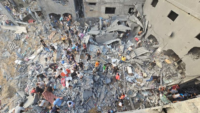
¿Derecho o violencia en el conflicto árabe-israelí?
Las bombas israelíes cayeron la semana pasada sobre la casa de mi amigo, Raji Sourani, director del Centro Palestino de Derechos Humanos en Gaza, y un icono en la lucha por defender los derechos de su pueblo. Tres días antes, Raji había declarado a una cadena de televisión estadounidense que no acataría la orden israelí de evacuar la ciudad de Gaza. “Estoy aquí como un olivo. Nunca abandonaremos nuestra patria”, pero cuando empezaron a caer las bombas, se preguntó si se había equivocado. “Me preguntaba si había hecho mal en negarme a marchar y ser parte de la nueva Nakba cuando el ejército israelí pidió a la población salir de la zona norte”, nos escribía a mí y a otros amigos.… Seguir leyendo »
